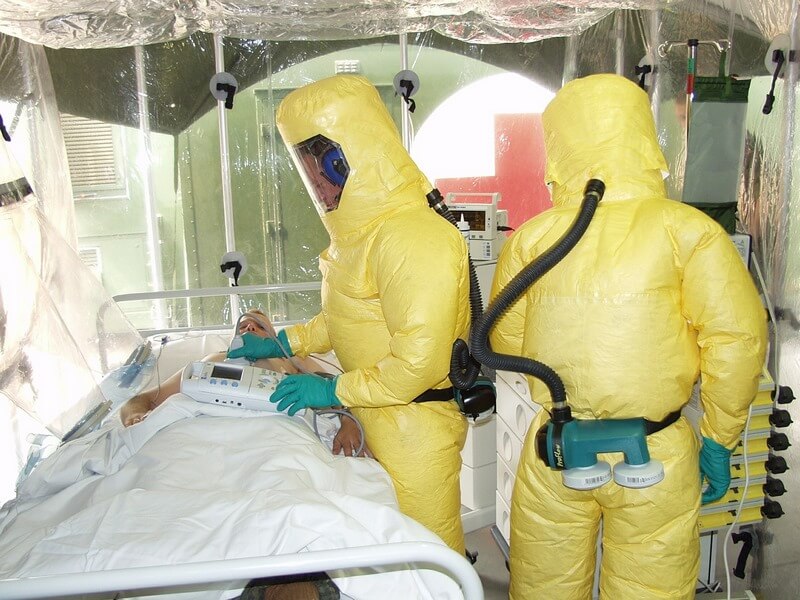
Ebola making headlines again
Could Ebola be the next pandemic? Ebola has raged in the Congo over the last year. The outbreak has received little notice outside of public health circles and Africa. Recent developments prompted the World Health Organization to declare it a Public Health Emergency (PHEIC) this month.
The move came after a man became sick and died in Goma, a city with an international airport neighboring Rwanda. Although the man’s history is known, the incident led to a meeting of the International Health Regulations Emergency Committee for EVD. The committee advised the declaration of the PHEIC. The announcement does not indicate that the medical responders are doing a poor job but raises awareness at the international level.
If you want to read the statement that the WHO released, you can find it here.

Concern, Chatter, and Pandemic Planning
The chatter on social media started after the emergency declaration on July 17th. Understandably, some are raising alarm bells. Others are encouraging peers to dust off their pandemic plans. It is an excellent time to revisit and update it if you haven’t done so in a while.
Having worked alongside my state’s Department of Public Health during the H1N1 pandemic in 2009-2010, I received first-hand education about the importance of a coordinated planning and response effort. If you want to learn more about H1N1, the CDC has a great timeline available here. Epidemics and Pandemics are different animals (if you don’t know the difference, here is a quick read).
The biggest eyeopener for me then was learning how many nurses needed vaccination administration training. It was also clear that the pool of public health nurses is dwindling across the U.S, a trend that continues today. As critical responder for vaccination clinics, this was alarming. However, innovation occurred when the private sector stepped in, offering pandemic clinics that are now utilized to dispense annual flu shots (think of your local pharmacy). H1N1 was the first pandemic in 40 years and showed us the gaps in our response capabilities, even with eight years of bioterrorism planning.
A good pandemic plan for business clearly states the roles of support and response within a company. It also highlights the role of public health and encourages employees to practice proper safety protocols. Last, it outlines its overall policies, clearly stating what is acceptable and who is responsible at each level of pandemic response and recovery activities.

Patient-Centered vs Virus-Centric Treatment
The Ebola epidemic over the past year in the Congo resulted in a 67% death rate. You can read the WHO’s recent stats published here. The reasons for this are complicated. However, current reports, like the AP’s Too many in Congo’s Ebola outbreak dying at home, points to cultural traditions overriding public health protocols.
As I’ve been writing in my blogs, understanding cultural norms of people, places, and organizations are fundamental to disaster resilience. In a past blog, I highlighted Shalini Unnikrishnan’s experiences working at the peak of the last Ebola crisis. She asserts that we need to treat people to be effective, not continuing the virus-centric approach.
I agree with her. To stop the spread of disease, we need to understand human behavior and cultural norms. It is more effective to work with communities than against them to prevent the spread of disease. For example, entire families are being wiped out due to the spread of the virus.
People see the treatment centers as places of death. For them, dying alone in a hospital is much worse than staying at home, surrounded by family. It is time for the medical system to adopt new treatments protocols allowing the infected treatment at home or inviting families into the hospital. The Lancet published an article, Ebola virus disease: clinical care and patient-centered research, in 2014 that called for the same.

Unlikely to become a Pandemic
Regardless of how the how fast or slow the medical system responds, the scientific community does not anticipate Ebola will become a pandemic. The risk of an Ebola pandemic is unlikely due to the rarity of the disease and infectious disease controls.
However, the PHEIC puts the world on notice of the seriousness of this outbreak. Added to this is the fact that there is no licensed vaccine. Citizens of the Congo can now participate in vaccine clinical trials.
Congo is a vast country in the middle of Africa. It has the opportunity to impact much of the continent if the Ebola breaks its borders. An EVD epidemic occurred in many West African countries during the last outbreak. So the threat is always a possibility.
Do you agree with the WHO’s declaration of a PHEIC for the Congo? Is a pandemic likely? Do you agree that patient-centered treatment would be more effective? I’d be interested in hearing your thoughts.
